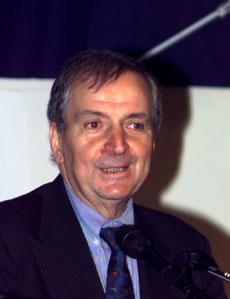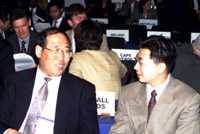 |
The first Global Ministerial Environment Forum - in the form of the Sixth
Special Session of the Governing Council (GC) of the United Nations Environment Programme (UNEP) - took place in Malmö, Sweden, from 29-31 May
2000. Over 500 delegates from more than 130 countries - including 73
ministers, and representatives of IGOs and NGOs - attended the three-day
Forum. The purpose of the Forum was to institute a process for regaining
policy coherence in the field of the environment, in direct response to the
need for such action emphasized in the 1998 report of the UN Secretary-General on environment and human settlements.
The Forum convened in parallel sessions of Ministerial Consultations, a
Committee of the Whole (COW) and a working group on the Malmö Declaration.
The ministers also considered a report by UNEP Executive Director Klaus
Töpfer on UNEP's activities and the organization's contribution to the
implementation of Agenda 21. The outcome of the Forum will be presented to
the fifty-fifth session of the General Assembly (the Millennium Assembly) in
September 2000. The Forum provided UNEP and its Governing Council with a key opportunity to
influence the international environmental agenda of the 21st century.
Environment ministers discussed major global environmental challenges in the
new century and strategic policy responses to such issues, as well as the
roles of the private sector and civil society. Consideration was also given
to the need to ensure the effective and efficient functioning of UNEP
governance mechanisms, and possible financial implications. Central themes
of the Forum were the need to match commitments with action, the key role of
UNEP in international environmental politics, and concerns about how to make
Rio+10 a "real" success.
|
| Wednesday,
31 May
|
|
| Ministers
and delegates convened for the final Plenary to adopt the
report of the meeting.
Hossein
Moeni Maybodi, Iran, presented the draft report of the Forum.
Colombia suggested that a letter circulated from Colombia's
Minister of Environment on the inclusion of civil society
participation in the Rio +10 process should be mentioned in
the final report. The US suggested that paragraph 9 on the
role of NGOs in promoting environmental agreements and public
awareness should include "promoting transparency and
non-corrupt practices in environmental decision making." In
paragraph 11 on civil society, Pakistan stressed the need to
build on capacity in civil society for such things as
environmental impact assessment. Benin commented that the
private sector should not allow for the relocation of
environmental problems such as pollution from one place to
another. Angola stated that the role of women has been
overlooked and stressed their involvement in policy and
strategies for improving the environment in developing and
developed countries. She also commented on the importance of
supporting youth in policy-making. After these amendments, the
report of the meeting was adopted.
|

|
 UNEP
Executive Director Klaus Töpfer said the UNGA decision to
give the world's environment ministers a forum for
discussion such as the Global Ministerial Environment Forum
had proved to be a good one. He stated the Forum had provided
a good start in the preparations for Rio+10.
UNEP
Executive Director Klaus Töpfer said the UNGA decision to
give the world's environment ministers a forum for
discussion such as the Global Ministerial Environment Forum
had proved to be a good one. He stated the Forum had provided
a good start in the preparations for Rio+10. |
| Zhenhua
Xie, Minister of State, Environment Protection Administration in
discussion with Zhijia Wang, Director General, Department of
International Cooperation, China. |

|
|

|
|
|
|
|